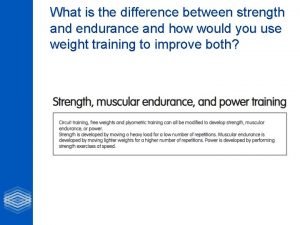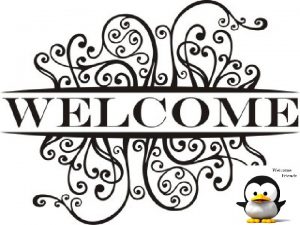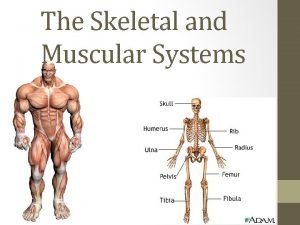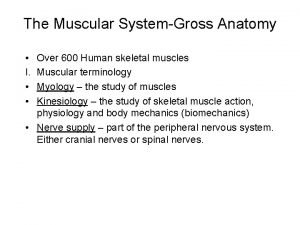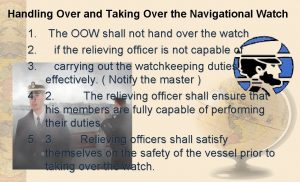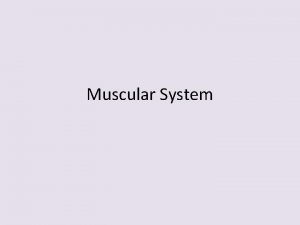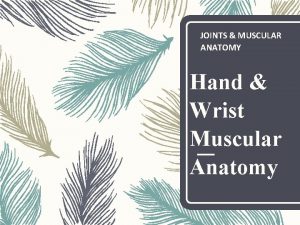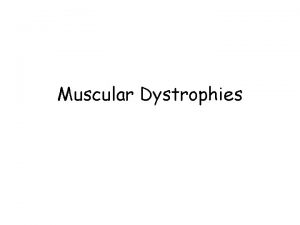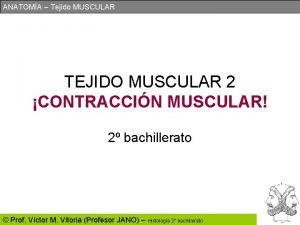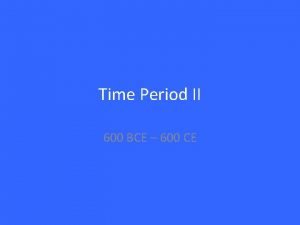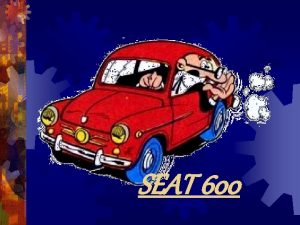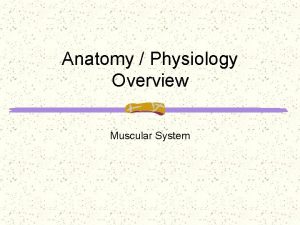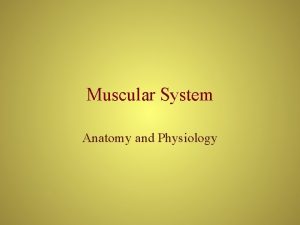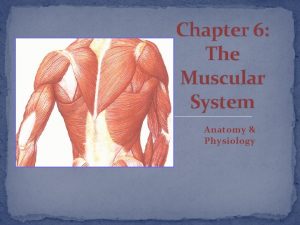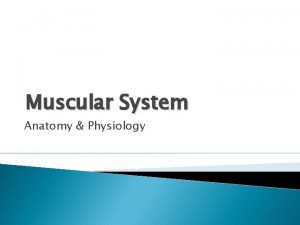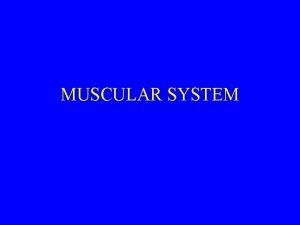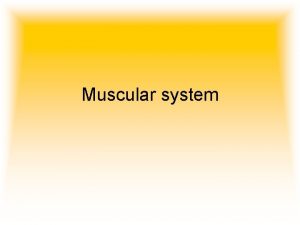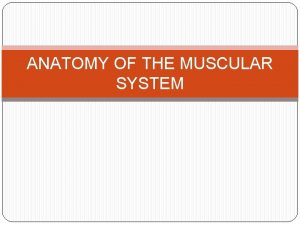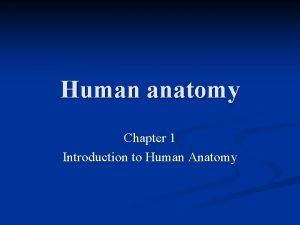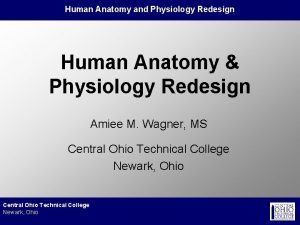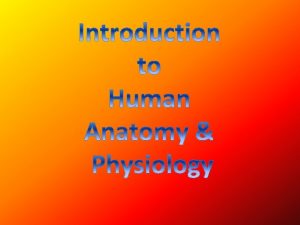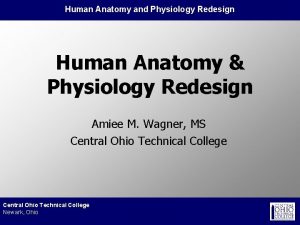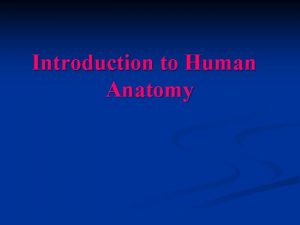The Muscular SystemGross Anatomy I Over 600 Human



































- Slides: 35

The Muscular System-Gross Anatomy • I. • • Over 600 Human skeletal muscles Muscular terminology Myology – the study of muscles Kinesiology – the study of skeletal muscle action, physiology and body mechanics (biomechanics) • Nerve supply – part of the peripheral nervous system. Either cranial nerves or spinal nerves.

Parts of a Skeletal Muscle • Origin – attachment to stationary end of muscle • Belly – thicker, middle region of muscle • Insertion – attachment to mobile end of muscle

II. Coordinated Muscle Actions A. Prime mover – produces most of force B. Synergist aids the prime mover – stabilizes the nearby joint – modifies the direction of movement that occurs C. Antagonist – opposes the prime mover D. Fixator – prevents movement of bone that prime mover is attached to , joint stabilizer

Muscle Actions during Elbow Flexion • Prime mover = brachialis • Synergist = biceps brachii • Antagonist = triceps brachii • Fixator = muscle that holds scapula firmly in place such as rhomboids

III. How Muscles are Named System of Latin names developed in 1895 – updated since then, last muscle- 1996 • English names for muscles are slight modifications of the Latin names. • Location Size • Action Direction of Fibers • Shape • Number of heads • Origin and Insertion

Skeletal Muscle Shapes • Fusiform muscles • Convergent muscle • Parallel muscles

Skeletal Muscle Shapes (2) • Circular muscles • Pennate muscles

IV. Gross Anatomy of Skeletal Muscleschapter 10

Major Skeletal Muscles: Anterior View

Major Skeletal Muscles: Posterior View

Muscles of Facial Expression • • Small muscles that insert into the dermis Innervated by facial nerve (VII) Paralysis causes face to sag Found in scalp, forehead, around the eyes, nose and mouth, and in the neck

Muscles of the Scalp and Forehead Frontalis Occipitofrontalis is found in the scalp. Frontalis raises the eyebrows while Occipitalis fixes the epicranial aponeuronesis which is a CT covering of the cephalic region

Muscles around the Eyes Orbicularis Oculi Nasalis Orbicularis oculi closes the lid. Nasalis widens nostrils, wrinkles nose

Muscles around the Mouth • Orbicularis oris encircles mouth called the “kissing muscle” because it is used to pucker lips • Zygomaticus group curl corner of mouth up in smile “smiling muscle” • Risorius- syngerist to zygomaticus, “laughter muscle” • Buccinator keeps food on top of teeth, blowing & sucking, “trumpeter’s muscle”, used for facial expression and chewing • Depressor Group (2)- draws angle of mouth downward Levator labii superioris Zygomaticus major Risorius Depressor anguli oris Depressor labii inferioris Buccinator Orbicularis oris

Some of the Muscles used in Facial Expression Tenses neck

Muscles of Mastication • Major muscles arise from skull & insert on mandible • Temporalis & Masseter elevate the mandible • Medial & Lateral Pterygoids help elevate, but produce excursion movement, used to grind • Buccinator- holds food in mouth Temporalis Masseter Lateral pterygoid Medial pterygoid

Neck Muscles Sternocleidomastoid Turn head to look behind or touch ear to shoulder Platysma- tenses neck

Muscles of Respiration -- Diaphragm • Muscular dome between thoracic and abdominal cavities • Contraction flattens it – increases the vertical dimension of the thorax drawing air into the lungs – raises the abdominal pressure to help expel urine, feces and facilitating childbirth

Muscles of Respiration -- Intercostals • External intercostals – pull ribcage up & outward during inspiration • Internal intercostals – pull ribcage downward during forced expiration

Muscles of the Abdomen • 4 Pairs of sheetlike muscles – external oblique – internal oblique – transverse abdominis – rectus abdominis

Rectus Abdominis & External Oblique • External oblique Superficial, Downward anteriorly Compresses abdomen Rotates trunk laterally External oblique • Rectus abdominis – vertical, straplike – Six pack abs – linea alba (CT) Compresses abdomen Rectus abdominis

Internal Oblique -Transverse Abdominis • Internal oblique – anteriorly – Upwards deeper Compresses abdomen Internal oblique • Transverse abdominis – horizontal fiber orientation – deepest layer Compresses abdominal contents Transverse abdominis

Anterior Scapular Muscle Group • Pectoralis Minor – protracts & depresses scapula – lifts ribs during forced expiration • Serratus Anterior – abducts & rotates or depresses scapula – Throwing and pushing muscle – “boxer’s muscle”

Posterior Scapular Muscle Group • Rhomboids – Retracts and rotates scapula, fixator of scapula Trapezius Raises and lowers Shoulders “shrugs shoulders” • Levator scapulae Elevates and retracts scapula

Muscles Acting on the Humerus • Muscles cross the shoulder joint to the humerus – Pectoralis major – prime mover of arm flexion adduction against resistance – Latissimus dorsi-prime mover of arm extension, powerful arm adductor (power stroke) Pectoralis major Latissimus dorsi Flexes upper arm Major chest muscle Extends and Adducts humerus Swimmer’s muscle

Muscles Acting on the Humerus Deltoid is prime mover of arm abduction, antagnostic to pectoralis major “shoulder pad muscle” 4 form the rotator cuff muscles that reinforce the shoulder joint capsule (supraspinatus, teres minor, infraspinatus, subscapularis)

Muscles Acting on the Elbow • Principal flexors – biceps brachii • Inserts on radius – brachialis • inserts on ulna, prime mover • Synergistic flexor – Brachioradialis • Flexors in order of strengthbrachialis, biceps brachii, brachioradialis • Extensor – triceps brachii • inserts onto ulna

Muscles of the wrist and handexamples • • Flex/extend wrist and fingers, adduct/abduct wrist Digitorum = inserts into fingers Carpi = inserts onto carpal bones Pollicis = inserts into thumb

Muscles of the wrist and handexamples • Extension of wrist and fingers, Adduct/abduct wrist • Extension and abduction of thumb (pollicis) • Brevis = short, Ulnaris = on ulna side of forearm Extensors

Muscles of Posterior Thigh Prime mover of Knee flexion Hamstring group (Biceps fermoris, semitendinosus, semimembranosus)

Muscles of the Anterior Thigh Tensor fasciae latae- abducts Sartorius Gracilis- adducts thigh Tailor’s musclecrossing legs Quadriceps femoris- prime mover of knee extension and hip flexion (Rectus femoris, vastus lateralis, vastus medialis, vastus intermedialis)

Posterior Muscles Acting on the Hip • Gluteus maximus – forms mass of the buttock – prime hip extensor – provides most of lift when you climb stairs Gluteus medius and gluteus minimusabducts thigh and stabilizes pelvic girdle for walking Gluteus medius Gluteus maximus Iliotibial band(tensor fascia latae) - abducts thigh

Adductors of the Hip Joint • 5 muscles act for adduction of the thigh • Adductor magnus is also an Adductor extensor of hip joint brevis Adductor brevis and Adductor longus adduct the Adductor femur longus Adductor magnus

Anterior Compartment of the Leg Tibialis anterior • Tibialis anterior = dorsiflexes and inverts foot

Posterior Compartment of the Leg Superficial Group of Plantar Flexors Gastrocnemius • Gastrocnemius = flexes knee and plantar flexes ankle
 Differentiate muscular strength from muscular endurance
Differentiate muscular strength from muscular endurance Nilai dari sin 600 + tg 600 adalah
Nilai dari sin 600 + tg 600 adalah Muscles
Muscles Anterior view of human body muscles
Anterior view of human body muscles Over the mountain over the plains
Over the mountain over the plains Siach reciting the word over and over
Siach reciting the word over and over Taking over navigational watch
Taking over navigational watch Hát kết hợp bộ gõ cơ thể
Hát kết hợp bộ gõ cơ thể Ng-html
Ng-html Bổ thể
Bổ thể Tỉ lệ cơ thể trẻ em
Tỉ lệ cơ thể trẻ em Voi kéo gỗ như thế nào
Voi kéo gỗ như thế nào Thang điểm glasgow
Thang điểm glasgow Chúa sống lại
Chúa sống lại Môn thể thao bắt đầu bằng từ chạy
Môn thể thao bắt đầu bằng từ chạy Thế nào là hệ số cao nhất
Thế nào là hệ số cao nhất Các châu lục và đại dương trên thế giới
Các châu lục và đại dương trên thế giới Công thức tính độ biến thiên đông lượng
Công thức tính độ biến thiên đông lượng Trời xanh đây là của chúng ta thể thơ
Trời xanh đây là của chúng ta thể thơ Mật thư anh em như thể tay chân
Mật thư anh em như thể tay chân 101012 bằng
101012 bằng độ dài liên kết
độ dài liên kết Các châu lục và đại dương trên thế giới
Các châu lục và đại dương trên thế giới Thể thơ truyền thống
Thể thơ truyền thống Quá trình desamine hóa có thể tạo ra
Quá trình desamine hóa có thể tạo ra Một số thể thơ truyền thống
Một số thể thơ truyền thống Cái miệng nó xinh thế chỉ nói điều hay thôi
Cái miệng nó xinh thế chỉ nói điều hay thôi Vẽ hình chiếu vuông góc của vật thể sau
Vẽ hình chiếu vuông góc của vật thể sau Biện pháp chống mỏi cơ
Biện pháp chống mỏi cơ đặc điểm cơ thể của người tối cổ
đặc điểm cơ thể của người tối cổ Ví dụ về giọng cùng tên
Ví dụ về giọng cùng tên Vẽ hình chiếu đứng bằng cạnh của vật thể
Vẽ hình chiếu đứng bằng cạnh của vật thể Vẽ hình chiếu vuông góc của vật thể sau
Vẽ hình chiếu vuông góc của vật thể sau Thẻ vin
Thẻ vin đại từ thay thế
đại từ thay thế điện thế nghỉ
điện thế nghỉ
